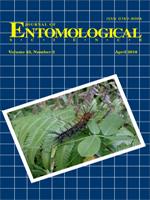Laboratory assays of the toxicity of seven vegetable seed oils (artichoke, bitter melon, castor, flaxseed, mustard, peach kernel, and rosehip) to eggs and nymphs of the pear psylla, Cacopsylla pyricola (Foerster), were conducted as well as the oviposition-deterrent potential of the oils to female winterform and summerform morphotypes. Despite low to moderate toxicity to the eggs, the oils caused high levels of nymph mortality (up to 99%) with mortality levels depending on the type of oils and the concentrations tested. Exposure to flaxseed, mustard, artichoke, and bitter melon oils resulted in the highest nymphal mortality. Overall, the deterrence of oviposition by the oils was higher against winterform females than summerform females. In choice tests, all oils except flaxseed oil at 1% and rosehip oil at 1%, 1.5%, and 2% deterred oviposition by winterform females. Female summerform oviposition was deterred in choice tests by peach kernel oil at 1% and mustard oil and bitter melon oil at 2%. In no-choice tests, significantly fewer eggs were produced by winterform females following treatment with mustard, bitter melon, artichoke, and flaxseed oils, and over 83% deterrence of summerform oviposition was observed in flaxseed and mustard oil treatments. Severe phytotoxic effects were observed with only a high concentration (2%) of artichoke and bitter melon oils. Based on these results, mustard, flaxseed, bitter melon, and artichoke oils appear to be candidates for development of control agents against eggs and nymphs of the winterform morphotype C. pyricola.
How to translate text using browser tools
1 April 2018
Laboratory Assay of Toxicity and Oviposition Deterrence of Selected Vegetable Seed Oils Against Cacopsylla pyricola (Homoptera: Psyllidae)1
Bilgi Pehlevan,
Orkun Baris Kovanci
ACCESS THE FULL ARTICLE

Journal of Entomological Science
Vol. 53 • No. 2
April 2018
Vol. 53 • No. 2
April 2018
alternative control
pear psylla
phytotoxic effect
summer oil
vegetable seed oil




